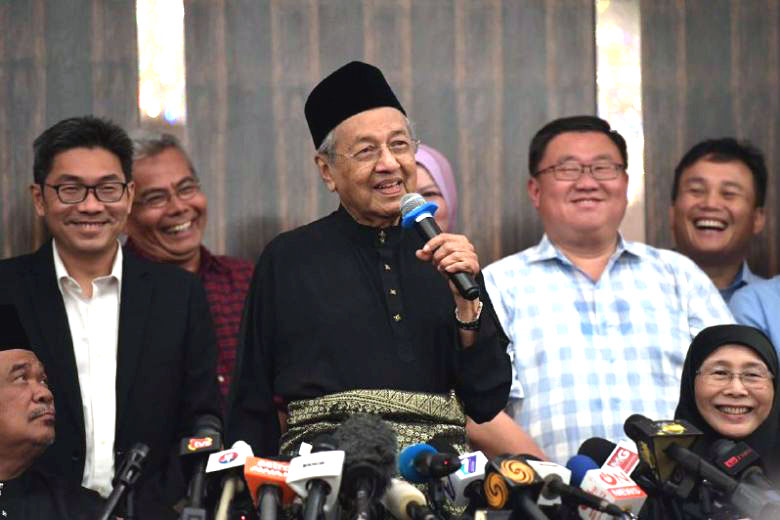Special to WorldTribune.com
By GIS/Defense & Foreign Affairs, Kuala Lumpur.
The return to office as Prime Minister of Malaysia of Dr Mahathir Mohamed, 92, on May 10, 2018, was expected to change the tone of affairs both within Malaysia as well as within the region.

Significantly, it is not Dr Mahathir’s age which was at the core of the changes which were anticipated, although he has indicated that he would hand over the office to his former Deputy Prime Minister, Anwar Ibrahim, within “a few years”, and, in the meantime, would ensure a Royal Pardon for Anwar, who was, at the time of the election, still imprisoned on what were seen to be politically-motivated charges.
Malaysians had gone to the polls for the country’s 14th general election on May 9, 2018, to elect all 222 seats in the Dewan Rakyat (People’s Hall) and 505 seats in 12 of the 13 state legislative assemblies.
What was particularly significant in this election was that former Prime Minister Mahathir Mohamad, 92, had re-emerged from retirement to contest the election on behalf of the opposition alliance, the Pakatan Harapan (Alliance of Hope), in an attempt to remove his old party, Barisan Nasional (National Front), which dominated the governing UMNO coalition, and its Prime Minister, Najib Razak.
Dr Mahathir cited his anger over the corruption of Prime Minister Najib as his reason to return to politics and on the side of the opposition. UMNO had held 133 seats in the outgoing 13th Parliament, and Malaysian United Indigenous Party (Parti Pribumi Bersatu Malaysia: PPBM), which was included in the Pakatan Harapan alliance, had 68 seats. What was perhaps more significant was that Pakatan Harapan had been led by Anwar Ibrahim, onetime deputy to then Prime Minister Mahathir, who had been consistently attacked by the UMNO Government, and was still in prison after facing allegations of sodomy.
Dr Mahathir had said that he would hand over the Prime Ministership to Dr Anwar when he was released from prison. Late on election night, even as rioting occurred when it was alleged that Government officials were attempting to introduce fake stuffed ballot boxes into the count, it became clear that Dr Mahathir — he had abandoned BN in 2016 — had secured more than the 112 seats needed for a majority. His coalition was confirmed to have taken 115 seats, and UMNO took 79 seats (a third party, Gagasan Sejahtera [Ideas of Prosperity, an Islamist party], part of the Malaysian Islamic Party, PAS, took 17 seats). UMNO’s loss marked the first change of power in Malaysia since independence in 1963.
Datuk Seri Wan Azizah binti Wan Ismail, who had been leading the opposition — and the presidency of the People’s Justice Party, part of Pakatan Harapan, and husband to Anwar Ibrahim — was named Deputy Prime Minister.
The strategic impact of the change of government included the fact that Dr Mahathir promised to scale back the level of former Prime Minister Najib Razak’s commitment to closeness with the People’s Republic of China (PRC). This would create minor concerns for Beijing, which had been working with the Najib Government on a range of logistical links bringing the Malay Peninsula into dependency on the PRC’s Belt and Road Initiative (BRI), such as a proposed new rail link.
This may be a subtle change, but it would open new prospects for better strategic relations between Malaysia and the United States (and its “Quadripartite” partners, Australia, Japan, and possibly India) at a time when the U.S. was, in particular, attempting to claw back influence in the region. [The U.S.-DPRK summit between U.S. President Donald Trump and DPRK leader Kim Jong-Un in Singapore on June 12, 2018, was another step by the U.S. to regain influence in the region.]
But, domestically, Prime Minister Mahathir was compelled, and willing, to deliver on his campaign promise to reduce corruption in the Malaysian Government. His credibility in this would depend on how vigorously he prosecuted officials engaged in the 1MDB (1Malaysia Development Berhad) case, the event which may have precipitated the fall of Prime Minister Najib’s UMNO/Barisan Nasional Government. Mr. Najib was accused of diverting more than RM2.67-billion (appr. $700-million) from 1MDB, a government-run strategic development company, to his personal bank accounts.
Once that scandal was investigated, there would be nothing to stop the unraveling of then-Prime Minister Najib’s allegedly illegal dealings with the French Parti Socialiste in the procurement of the Royal Malaysian Navy’s “white elephant” program to acquire two Scorpène and one Agosta 70 submarines. [This was covered by this service on April 13, 2012, as “Defense Procurement: Politicization Without Performance; How the Malaysian Submarine Scandal Could Help Determine the Outcomes of the French and Malaysian Elections”] This scandal reportedly was highly financially beneficial to both Prime Minister Najib and (now) former French President François Hollande (before he took office).
On April 3, 2013, this report detailed how the RMN would, after all the costs, now dispose of the two Scorpènes, quoting Prime Minister Najib as saying “The damn things have never caused us anything but trouble. If we hadn’t bought them, we could have held that stinking election a year ago and I’d be home and dry by now.”
So Dr Mahathir would now push the Government to prosecute outgoing Prime Minister Najib and members of his Government. Indeed, Dr Mahathir was stirred to return to government when he saw the degree to which his former party and bloc, Barisan Nasional and the United Malays National Organization (UMNO), had descended into such blatant corruption. The question will be how much of this scandal would lead to officials in France and the PRC.
